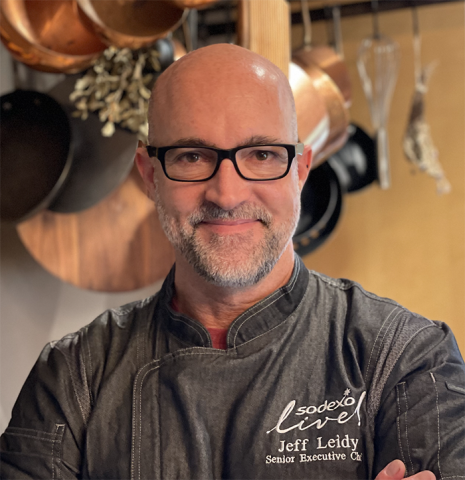Taste Trends: Jeff Leidy, Senior Executive Chef–West, Sodexo Live!

Chef Jeff Leidy is one of those lucky people who found his calling at a very young age. The consummate hospitality culinary professional began his four-decade-long career at 16, starting as a busboy in a steak and seafood house, where he quickly moved into the kitchen and fell in love with the culinary arts.
“I have been cooking professionally ever since,” Leidy said. “I like to tell people that you don’t choose to be a chef, it chooses you. I was captivated by every aspect of being a chef—having the chance to be creative and serve guests who give you immediate feedback, and the ability to work with a collaborative team.”
Leidy never looked back, graduating with honors from The California Culinary Academy in San Francisco and launching a longstanding career that has included working in major and minor league sports, convention centers, museums, zoos and other cultural destinations. The award-winning culinarian has created menus for political dignitaries ranging from former Vice President Al Gore to former Soviet Union President Mikhail Gorbachev.
Additionally, his commitment to eco-friendly culinary practices has earned him a distinct reputation for altering the way people think about cuisine in modern convention centers.
Before assuming his current role at venue hospitality partner Sodexo Live!, where he is responsible for overseeing all culinary operations for the Western U.S. and Canada, Leidy acted as the regional chef for the organization, overseeing culinary operations at the San Diego Convention Center and surrounding area venues.
TSNN had the opportunity to get Leidy’s thoughts about the current event food and beverage trends taking shape in 2022, including what it was like to oversee the culinary operations at CES this year.
What are the biggest food and beverage changes that you’re seeing in the industry at this time?
We continue to see a desire for fresh foods that are prepared in front of the guest. There is a big desire for attendees to not only know what is in their food, but also to understand how it is made. With the continued challenges of COVID, though, people still have a desire for more prepackaged items, so we do live action where we can, always keeping food safety top of mind.
What are some pre-COVID F&B trends that are no longer hot and why?
I think the trends are very similar to what they were prior to the pandemic. As a result of COVID, though, people gained more time at home, so they started to cook more, and it created a new interest in food, from more sourdough bread to healthier comfort foods.
People have become more aware of how their food is prepared and where it came from. Food prior to COVID tended to be more intricate and tended to be heavier, it had more steps, so if anything, we’ve simplified things and gone more minimalist.
Prior to COVID, dietary-conscious menus were a big and growing trend. Is this still true and if so, do you foresee this accelerating in the future? Why or why not?
We are still seeing an emphasis on healthy menu items prepared with fresh ingredients. People want to know where their food is sourced, and they’re very particular. This is a good thing! It’s good to see guests engaged in the food ecosystem.
Yes, gluten-free menu choices are still very popular with guests, but I think we are moving away from keto and paleo diets and moving towards more plant-based foods, which would include more vegan and vegetarian menu offerings.
What were the challenges and logistics of handling food and beverage for CES 2022, and did the Las Vegas Convention Center team do anything differently this year than in years past?
CES is one of our biggest shows of the year that requires a considerable amount of planning and logistics. We start planning this show months in advance, with full collaboration from Sodexo Live!, the Las Vegas Convention and Visitors Authority and the Consumer Technology Association. Unfortunately this year, with the recent Omicron surge, there was a drop in attendance from what we had earlier forecasted. This required us merely to adjust our food quantities, but our basic plan stayed the same. A silver lining of the final day being canceled was that we were able to donate about 1,000 boxed lunches and other nonperishable items to a few local food banks, to support the local Las Vegas community.
Many event planners are going to be working with even tighter budgets when events fully resume. What are your top tips for overcoming this obstacle while still providing delicious fare for attendees?
When I am working with clients, I prefer to work on curating custom menus. It allows the event planner and the host property the opportunity to work within their budget and to create menus that are on-trend and structured to the specific needs and tastes of the guest. My advice for planners is to speak up early—express the vision you have and the menu items you’re looking for. This gives the culinary team time to plan and course, so the event can be a great success.
Don’t miss any event-related news: Sign up for our weekly e-newsletter HERE and engage with us on Twitter, Facebook, LinkedIn and Instagram!


Add new comment